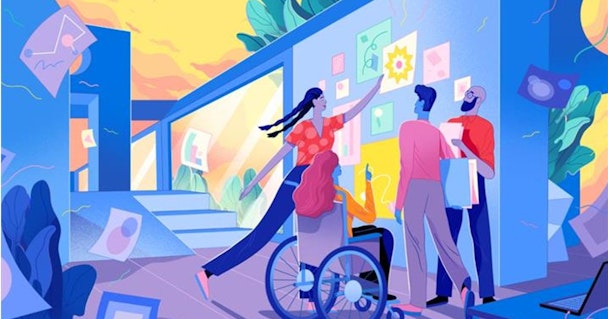Over 70% of Unilever’s ads will now have disabled representation behind the camera
The FMCG giant has set a new commitment as part of its Act 2 Unstereotype initiative.

Unilever makes new commitment to improving disabled
Any Unilever brand's advertising production that costs over €100k will now have to ensure that at least one member of the disabled community is involved in the process. From casting to writing, editing or directing, at least one of these roles should be filled by a disabled creative during the production of a campaign.
It’s a mandate that's been 18 months in the making. Unilever’s chief brand and DE&I officer Aline Santos told The Drum that its long-running commitment to improving diverse representation in its advertising, both in front of and behind the camera, has focused on four key areas: gender, race and ethnicity, sexual orientation, and disability.
Today, for example, 51% of females included in a pitch process are winning the work.
Advertisement
But Santos says its inclusion of disabled people in the ad-making process has been lagging: “Among all the challenges, we felt it deserved more attention,” she says.
At present, persons with disabilities only represent 8.3% of roles on-screen and 6% off-screen in the UK. In the US, 34% of consumers feel underrepresented in the media and 52% feel inaccurately represented.
It conducted global research on what social content creators form the disabled community – a group already using their creative, writing, video, editing, and production skills – feel about the advertising industry. It found 62% would consider a job in advertising, TV or film but the overwhelming majority (90%) said that they feel people’s attitudes and mindsets are having an impact on including them on production sets.
Advertisement
Santos and Dana Cadden, Unilever’s global head of advertising production, worked with partners, Inclusively Made, founded by Bus Stop Films, along with inputs from global disability advocate organisations from the UK and US, to develop an ‘Inclusive Production Toolkit’ that outlines the best practices to make advertising production more disability-confident and inclusive of people’s needs.
That toolkit has been issued to every ad agency and production company on Unilever’s global roster to ensure that every set is inclusive. Santos says, despite the positive attitude towards the commitment, there was some initial hesitancy as to how ensuring disabled representation would impact production schedules and costs.
“At the beginning, there was concern about finding the talent or slowing down the productions. But we’ve not found any problems,” says Santos.
Suggested newsletters for you
It’s been six months since agencies were given the mandate to change. “We briefed all our roster of [creative] agencies and ad production agencies, and all producers," continues Santos. "They all knew we were testing and developing. We told them about the developments a year ago and they were positive. They are fully behind us. They also want the same unstereotypical advertising, they want more inclusive environments.”
WPP and IPG chiefs Mark Read and Philippe Krakowsky have lent their public support to the company’s commitment, which spends an estimated €3.7bn a year on advertising.
“Building diverse teams that better reflect society is not only the right thing to do, but it also helps us create campaigns that better resonate and connect with consumers,” adds Read. “Our long-established partnership with Unilever has always strived to break down stereotypes in the content we create. We’re proud to support this initiative to help further drive inclusivity, in front and behind the camera, and look forward to more brands adopting the Inclusive Set Commitment.”
WPP has said it will share the ‘Inclusive Production Toolkit’ across its agency network to encourage adoption among other clients.
As agencies and brands try to clamp down on the cost of production in the current economic climate, Unilever has stressed it will cover the cost of any adjustments that are made to sets. Santos says the price of making these changes is inconsequential in comparison to the big budgets it spends on creating a campaign.
“We pay for it all. But it’s nothing - nothing! If you have a physical disability, you need a space people can move around with safety and comfort. If someone needs, for example, a sign language interpreter then we pay for that. Compared to the cost of the production it is nothing! Our experience in every production shows us that it benefits the whole production. Of course, it’s sometimes a little more…but we pay. We never ask anyone to do anything for free. Our marketers are not concerned about the extra costs.”
She has encouraged all advertisers to join in the commitment. The toolkit can be downloaded here.

